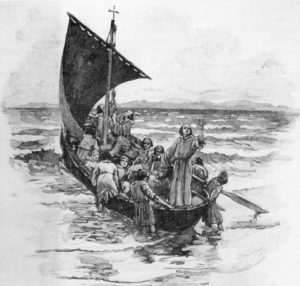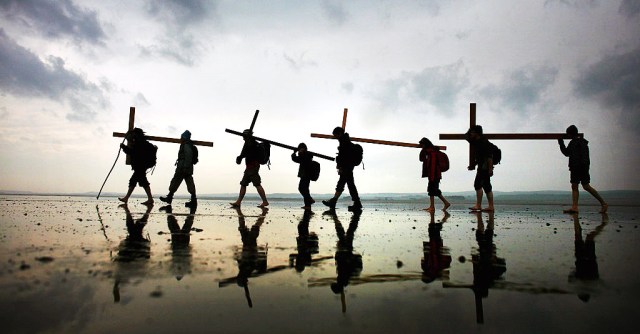Pilgrims in Northumbria, where the holy history owes much to Irish missionaries. Credit: Jeff J Mitchell/Getty Images

Once, long before Partition, the Potato Famine, Drogheda, the Plantation of Ulster, the Statutes of Kilkenny and Henry II’s landing at Waterford, Anglo-Irish relations stood on an even and happy keel. “A people who never did anyone any harm, and were always most friendly to the English.” So wrote Bede, the greatest scholar of the Northumbrian golden age, in the early 8th century. Ireland was celebrated not just for the asceticism of its holy men and women, the formidable quality of its learning, and the indefatigability of its missionaries, but also for its hospitality. Many in Northumbria travelled there, Bede wrote, to learn from the example of its inhabitants. “The Irish welcomed them all gladly, gave them their daily food, and also provided them with books to read and with instruction, without asking for any payment.”
The readiness of the Irish to share with the English the good news of God’s purposes stood in dark contrast to the failure of the native inhabitants of Britain to do the same. Bede, writing the first ever history of his people, described how, in the aftermath of the collapse of Roman rule, the pagan ancestors of the English had arrived in the island and made their homes there. The Britons, far from welcoming them and guiding them to baptism, had instead met them with sword and fire. The consequence was that for many generations much of the island had been lost to heathendom.
“But God in His goodness did not utterly abandon the people whom he had chosen; for he remembered them.” Missionaries had come from Rome to convert the pagan English; and they had come, as well, from Ireland. Kingdom after kingdom had been brought to acknowledge Christ. The Britons, meanwhile, judged and found wanting by God, had been justly punished. Pushed westwards by the English, they had been confined to mountains and sodden valleys. The immigrants had become the rulers of the fairest portions of the island; the natives the aliens. “Wealas,” or “foreigners,” the Britons were derisively termed by their conquerors: “Welsh”.
This perspective was, of course, one distinctive to the English. The Britons naturally had their own, very different take on the matter. Their failure to evangelise Bede’s forebears was due, not to any lack of Christian zeal on their part, but rather to the savagery and barbarism of the invaders themselves. In support of this argument, they could appeal to the very people so lauded and admired by Bede: the Irish. That Ireland had been won for Christ in the first place was the doing of a Briton.
Patrick, the son of a Latin-speaking landowner in the west of Britain, had been kidnapped some time in the mid-5th-century, and sold across the Irish Sea. Whether working as a shepherd, or fleeing his master by ship, or returning to Ireland to spread the word of God, angels had spoken to him, and guided him in all he did; nor had he hesitated, when justifying his mission, to invoke the imminence of the end of the world. The force of his preaching and the power of his example had served to reap a spectacular harvest. By providing the Irish with a template of holiness, Patrick had achieved something literally miraculous: the transformation of Ireland into a mighty stronghold of the Christian faith.
So it was, at the limits of the world, where the grey and heaving ocean stretched as far as the eye could see, monks came to serve as Christ’s vanguard, and by their prayers keep sentry against the Devil and his legions. Tales were told of those who sailed beyond the horizon, and found there both mountains of eternal fire — where burning flakes of snow fell on the damned — and the fields of Paradise, rich with fruit and precious stones. True or not, it was certain that some monks, taking to the treacherous waters of the Atlantic, had made landfall on jagged spikes of rock and there fashioned cells for themselves.
Cold and hunger, which kings built great feasting-halls to keep at bay, were valued by Irish holy men as pathways to the radiant presence of God. A monk who knelt for hours in sleeting rain, or laboured on an empty stomach at tasks properly suited to a slave, did so in the hope of transcending the limitations of the fallen world. “Mortal men, so people believed, were living the lives of angels.” Nowhere else in the Christian West were saints quite as tough, quite as manifestly holy as in Ireland.
Their only duty was to God. Monasteries, like ringforts that dotted the island, were proudly independent. An iron discipline was what served to maintain them. Only a rule that was “strict, holy and constant, exalted, just and admirable,” could bring men and women to the dimension of the heavenly. Monks were expected to be as proficient in the strange and book-learned language of Latin as at felling trees; as familiar with the few, ferociously cherished classics of Christian literature that had reached Ireland as at toiling in a field. Like Patrick, they believed themselves to stand in the shadow of the end days; like Patrick, they saw exile from their families and their native land as the surest way to an utter dependence upon God.
Not all sought the gale-lashed isolation of a rock in the Atlantic. Some, heading southwards, took ship for the continent, and the lands of the Franks. Others, crossing the sea to Britain, there preached the Gospel to the kings of peoples who still set up idols, and wallowed in paganism. It was, for the future of the lands that in time would be known as England and Scotland, a momentous, an epochal development.
Most awesome of all the Irish saints who made their home in Britain was a man of royal descent who, as a slave of Christ, won for himself infinitely more renown and authority then he would ever have done as a warlord. Born in 521, he was called by his parents Crimthann, “Fox”; then, as a boy, he was renamed by the priest who baptised him Colum — “Dove”. Even by the ferociously exacting standards of Irish monastic schools, he proved himself a formidable student. So astounding was his knowledge of the psalms that other children began to hail him as Colum Cille: “Dove of the Church”. His teachers, meanwhile, addressed him by the Latin form of his name: Columba.
It did not take him long, once he had come of age, to win a reputation for himself as a figure of awesome and even terrifying holiness. Modest, humble and always gentle with the unfortunate, he could at the same time, like the Holy Spirit which had descended upon Jesus in the form of a dove, blaze and scorch like fire. Rapists would drop dead when he cursed them. Princes would tremble when he foretold their doom. Even the Loch Ness Monster, confronted in its watery lair, cowered and fled when the holy man made the sign of the Cross.

As in Ireland, so in Britain, Columba was at home in twin dimensions: the dimension of the miraculous, in which angels stood watch over him and fiery pillars blazed in the sky at the hour of his death, and the dimension of earthly power, in which he consistently showed himself to have preserved something, at least, of the vulpine. Why had he left his native land? “He sailed away from Ireland to Britain,” so his earliest biographer wrote, “choosing to be a pilgrim for Christ.” Perhaps, however, this was not the entire story.
It was claimed as well that Columba had taken sides in a factional battle between northern and southern branches of the Uí Néill clan, and secured victory for the northerners by virtue of his prayers. Then, rather than risk becoming further embroiled in the rivalries of Irish warlords, he had sailed across the sea and founded a monastery on a lonely island off the Scottish coast. Iona, the site of this monastery, remains to this day a place renowned for its holiness, consecrated to the memory of its founder, an enduring centre of pilgrimage and prayer.
Yet the prestige that Columba enjoyed as abbot of this remote and storm-battered spot was not due solely to his sanctity. He was also the most princely Irishman in the whole of Britain, a man well qualified by birth as well as by saintliness to serve as a counsellor of great rulers. In 576, when the taoiseach, or leader, of the Gaelic-speaking peoples of western Scotland died, his cousin, Áedán mac Gabráin, came to Iona to be consecrated as king. Columba, it is said, anointed him with oil just as the kings of ancient Israel had once been anointed; but only after an angel, angry with the saint for showing reluctance, had lashed and permanently scarred him with a whip. The saint — though from that time on he served Áedán rather as Merlin served Arthur, or Gandalf Aragon — did not for that reason scorn to have dealings with the rulers of other peoples.
He eased the spiritual anguish of Rhydderch, king of the Welsh-speaking Britons whose stronghold, the mighty rock of Dumbarton, dominated the banks of the Clyde. He brought the news of Christ to the pagan king of the Picts, banishing thick mists conjured up by Pictish wizards, and performing miracles of healing. Perhaps most momentously of all, three and a half decades after his death, he appeared in a vision to the young Northumbrian prince Oswald, on the eve of a great battle fought in the shadow of Hadrian’s Wall. “Be strong and act manfully,” the saint told Oswald. “Behold, I will be with thee.” And so he was.
Much would flow from Oswald’s victory: the coming of Irish holy men to Northumbria; the founding on the island of Lindisfarne of a monastery that in time would come to rival that of Iona for holiness and learning; the sense of a great debt owed to the Irish which Bede, who held Columba in the highest regard, gratefully and repeatedly acknowledged.
No one would cast the early medieval period in Britain or Ireland as a time of peace. Both islands were a patchwork of rival kingdoms; both islands were repeatedly ravaged by war. Nevertheless, the story of Columba, whose charismatic sanctity stands close to the fountainhead of the long and often troubled relationship between the English and the Irish, is rendered, if anything, only the more inspiring by reason of that.
Today, in the city which Nationalists call Derry and Unionists Londonderry, both the Catholic Long Tower church and the Anglican cathedral are dedicated to Colum Cille. In Britain, the memory of Columba is one to be cherished by all the various peoples of the island: by Scots, and English, and Welsh. If there is a single saint qualified to serve the Atlantic Archipelago as its patron, then that saint is surely Columba. “For it is no small favour conferred by God on the man of blessed memory, that one who dwelt in a small island on the edge of the ocean should have earned a reputation that sounds not only across his native Ireland, but across the whole of Britain as well.” History is not always a nightmare from which we are trying to awake.










Join the discussion
Join like minded readers that support our journalism by becoming a paid subscriber
To join the discussion in the comments, become a paid subscriber.
Join like minded readers that support our journalism, read unlimited articles and enjoy other subscriber-only benefits.
Subscribe